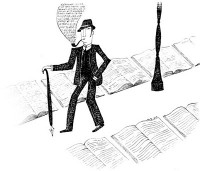Lily Hoang
https://literature.ucsd.edu/people/faculty/lhoang.html
Lily Hoang has published some books and won some awards. She is Director of the MFA in Writing at UC San Diego.
https://literature.ucsd.edu/people/faculty/lhoang.html
Lily Hoang has published some books and won some awards. She is Director of the MFA in Writing at UC San Diego.
This just in: Fairy Tale Review Press books are now available at Weightless Books for a staggering $2.99 a pop. You’d be silly not to get one. You could get the venerable Johannes Goransson’s Pilot or the stunning Ashley McWater’s Whitework, or heck, since I’m cravenly self-promoting, that’s what the tag below says, you could even get my book.
And wait! There’s more! Next week, all issues of Fairy Tale Review will be there, just one little click away from your satisfaction.
 In Madness & Civilization, Michel Foucault says:
In Madness & Civilization, Michel Foucault says:
The novel constitutes the milieu of perversion, par excellence, of all sensibility; it detaches the soul from all that is immediate and natural in feeling and leads it into an imaginary world of sentiments violent in proportion to their unreality, and less controlled by the gentle laws of nature. (219)
If Foucault says this about readers of novels, just think about what it means for writers of novels.
Robert Schumann said: People compose for many reasons: to become immortal; because the pianoforte happens to be open; because they want to become a millionaire; because of the praise of friends; because they have looked into a pair of beautiful eyes; for no reason whatsoever.
Vladimir Horowitz said: I am a general. My soldiers are the keys and I have to command them.
Six months ago, I was in Cambodia, where I saw houses that jarred me out of complacency, thinking over Woolf’s call “that it is necessary to have five hundred a year and a room with a lock on the door if you are to write fiction or poetry” (105). You can read about it here.
Three days ago, my laptop bid me adieu in a very aburpt fashion, unexpected, though even if it had been expected, that wouldn’t have changed a thing, hopefully, it’ll be ok, it’s being “diagnosed” now, but over the last few days, I’ve reframed Woolf’s concept of “room” to fit today’s modern sensibilities.
Alexandre Dumas said: The man of genius does not steal, he conquers.
And Robert Schumann said: Talent works, genius creates.
And Oscar Wilde said: Talent borrows; genius steals
And Pablo Picasso said: Bad artists copy. Good artists steal.
Or maybe Pablo Picasso said: The bad artists imitate, the great artists steal.
And Igor Stravinsky said: Lesser artists borrow, great artists steal.
And T.S. Eliot said: One of the surest tests is the way in which a poet borrows. Immature poets imitate; mature poets steal; bad poets deface what they take, and good poets make it into something better, or at least something different. The good poet welds his theft into a whole of feeling which is unique, utterly different than that from which it is torn; the bad poet throws it into something which has no cohesion. A good poet will usually borrow from authors remote in time, or alien in language, or diverse in interest.
In response to the Huffington Post’s over-rated writers list, PW makes an under-rated writers list. On Jesus Angel Garcia‘s FB page, there’s a discussion going on exactly what makes a writer under-rated. I mean, come on: Tao Lin is on the list, along with the likes of Deborah Eisenberg (a Guggenheim fellowship, three O’Henry’s, a MacArthur, etc.), Mary Gaitskill (been in Nyer, Harper’s, Esquire, etc), and Donald Antrim (finalist for a PEN/Faulker, frequent NYer contributor, etc), all writers I would say have received ample attention. If this is what it takes to be under-rated, what does someone have to do to be over-rated? (Don’t answer that. I already know the answer: be Jonathan Safron Foer or Junot Diaz.) To be fair, there are also some truly under-rated writers on their list. What do you think?
 Always late to the game, I didn’t learn about the term flâneur until I was in grad school, which is probably a good thing. See: I grew up in Texas. Texas is not a place for strolling, or at least San Antonio is not a place for strolling. It’s hot and everything is spread too far to make walking comfortable. Texas is a place for sitting, not walking, not moving.
Always late to the game, I didn’t learn about the term flâneur until I was in grad school, which is probably a good thing. See: I grew up in Texas. Texas is not a place for strolling, or at least San Antonio is not a place for strolling. It’s hot and everything is spread too far to make walking comfortable. Texas is a place for sitting, not walking, not moving.
Baudelaire conceptualized a flâneur as someone who walks or strolls in order to experience his surroundings.
So for most of my life, I’ve been a sitter. Never the athletic type, I’d rather sit than sweat. But when I learned about the flâneur, I’ve wanted to modify myself to fit that romantic notion—Baudelaire: the romantic—of a person who absorbs and experiences through the act of walking. I wanted to want that (because I didn’t actually want it: I’d rather sit than move, still), but through time, I’ve trained myself out of my Texan laze. Now, I bike and walk, I strive to understand the world at a slower pace.
 But then, but then, I learned about Georges Perec’s newest translation, At Attempt at Exhausting a Place in Paris. After years of training myself to want to walk, Perec gives me a reason to sit. In An Attempt, Perec provides a “sociological survey” of the infraordinary, which roughly translates as what happens when nothing happens. Over a period of three days, Perec watches a square in Paris, Place Saint-Sulpice, shifting locations periodically from café window to café window to park bench. By sitting (as opposed to walking or moving), he notes the birds, the weather, the passing of cars and buses, people walking and people sitting, people eating and how they eat, which hand they use or do not use, Georges Perec is charming, the most charming man I will never meet, and An Attempt is yet another charming example of his charm.
But then, but then, I learned about Georges Perec’s newest translation, At Attempt at Exhausting a Place in Paris. After years of training myself to want to walk, Perec gives me a reason to sit. In An Attempt, Perec provides a “sociological survey” of the infraordinary, which roughly translates as what happens when nothing happens. Over a period of three days, Perec watches a square in Paris, Place Saint-Sulpice, shifting locations periodically from café window to café window to park bench. By sitting (as opposed to walking or moving), he notes the birds, the weather, the passing of cars and buses, people walking and people sitting, people eating and how they eat, which hand they use or do not use, Georges Perec is charming, the most charming man I will never meet, and An Attempt is yet another charming example of his charm.
To read Perec is, in many ways, to be magicked away. His focus on detail, lists and lists, whether the items on his desk or the way of categorizing books (examples of his non-fiction from Species of Space), rather than exhaust the reader, excites. It seems illogical, that the minutia of the banal could be magical or charming, but such is Perec’s special charm.
The ever-edifying Joyelle McSweeney talks about genre:
So we all think we don’t want genre, we want to be anti-genre or perhaps hybrid, but since these are genres too, let us think about what it means to really go genreless. To go genreless in our contemporary publishing environment is to make a work without a ‘document map’, without a diagram, without a blueprint. Without a sales category. A work such as this has no overview or topography. It can’t be nicely summarized. It cannot be publicized, because it lacks ‘publicity’. In place of publicity it has secrecy, distortion, obscurity, waste. It is a waste product.

Today’s some made-up holiday, which means places are closed, so to celebrate, here‘s a new story by Nick Mamatas. It’s a weird little ditty with lols a-plenty, I mean, if you like that kind of stuff, laughing, I mean, out loud.
And here, Johannes Goransson says a metaphor to explain his vision of an ideal poem is an “infestation of language.” I like that.
And here, Michael Kimball says he likes pizza and ice cream. I like pizza and ice cream too.
And, just for holiday kicks, she got married yesterday, and seriously, the big story is about her dress.
And that’s all I have to say.